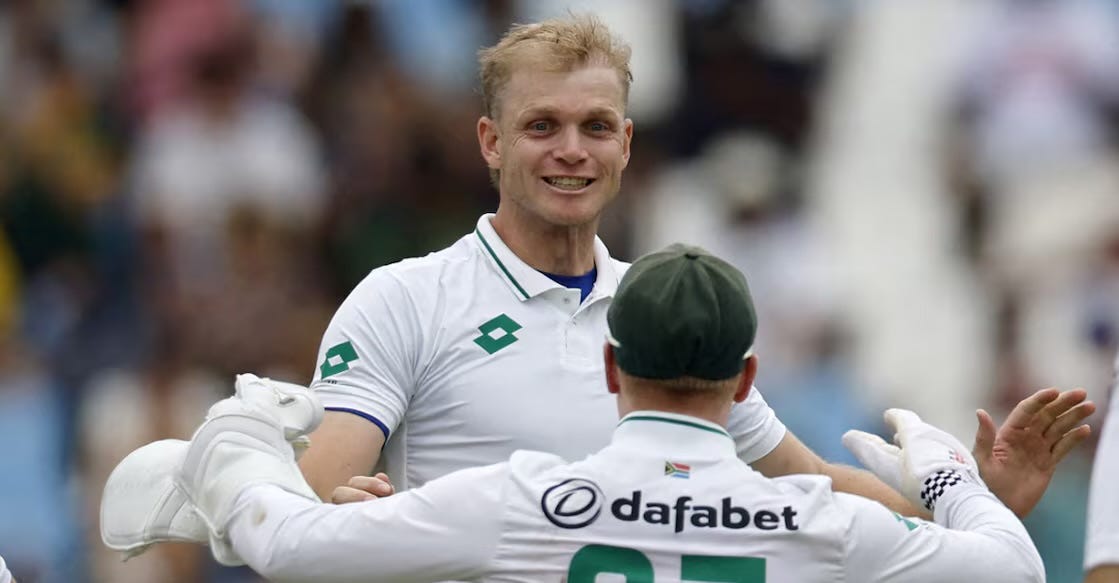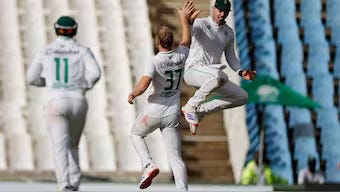South Africa’s massive win against Zimbabwe in Bulawayo was a cause for many reasons to smile, little of which had to with the victory or even the size of it. A margin of 328-runs represents a job very well done but so much more was achieved, including the next step on the host nation’s concerted ambition of joining the World Test Championship.
There was the fist-pump for 30-year-olds from Corbin Bosch who became just the fourth South African to score a century and claim five-wickets in a Test match. Jimmy Sinclair (106 & 6/26) did it first in 1899 when cricket was a hobby fitted in around ‘real life’ and the legendary maverick, Aubrey Faulkner, achieved the feat against England in 1910 at the old Wanderers with 123 and 5/33.
But it would be another 89 years before it was repeated with Jacques Kallis scoring 110 and taking 5/40 against the West Indies at Newlands in 1999. Next on the list, just three years later, was the same man: the great Kallis scored 139 and collected 5/21 against Bangladesh in Potchefstroom. And that was it, before Bosch.
Pursuing a career goal as an accountant or plumber is different. Work hard, persevere, and you’ll get there. The goal-posts don’t move and there’s plenty of time. Years. The opposite is true in professional sport. The window of opportunity is small and is often closed well before an athlete is, or even believes, they are approaching their best. The toughest years, if you haven’t ‘made it’, are between 27 and 29. By 30 they are writing you off.
Bosch, however, just kept getting better, year after year. He ignored the queue of fast bowlers ahead of him for national honours and refused to be persuaded by common sense or conventional wisdom. It’s hard to imagine anyone outside of Bulawayo calling the humble Queens Sports Club the ‘greatest stage’ or the ‘ultimate honour’ but that’s what it was for Bosch whose unbeaten century was his first in any form of cricket before ripping through the home side’s second innings batting with 5-43. His Test batting average is currently 108.5 and his bowling average 19.10, so he’s made a fair start.
It was all many thousands of kilometres away from Edgbaston, literally and metaphorically, as the second match in ‘Big Three’ series between England and India kicked off in front of the inevitable sell-out crowd. The strategizing and long-term planning for five-match series is something South Africa’s players last experienced 21 years ago when the Basil d’Oliveira Trophy was contested in South Africa in 2004/5.
The continuing commercial success of Test cricket in England has led the ECB to talk of expanding their summers to back to seven Tests and playing five-Test series against nations other than Australia and India – and South Africa, as wishfully predicted when the Proteas were close to qualifying for the WTC final, are top of the English wish-list. Especially after their triumph at Lord’s.
A return of five-Test series in South Africa is still a faint, probably unrealistic hope unless the players’ enthusiasm for the format is matched by the administrators who currently measure financial feasibility only in the short, or even immediate term. There is no medium or long-term planning.
Fears that the most talented players were turning away from Test cricket were justified – but only because there wasn’t enough of it, not because they preferred to play T20. Of course the less driven, committed and skilful cricketers will chose 2x120 balls over 450 overs, but the best will always opt for the greatest challenge and most satisfying reward.
India inadvertently dug themselves into a deep hole before the current series by announcing that Jasprit Bumrah would only play three of the five Tests. It was well-intentioned – to explain and justify Shubman Gill’s appointment as captain ahead of the more charismatic and players’ choice as Rohit Sharma’s replacement, Bumrah. But a 17-man squad suggests a surfeit of indecision and confusion.
It does, however, add to the tactical nuance of reading conditions and second-guessing the opposition. While India juggle Bumrah’s availability, England have Jofra Archer, Gus Atkinson and perhaps even Mark Wood as aces to play later in the series.
In years to come South Africa might, once again, enjoy the privilege of a prolonged test of their physical, mental and tactical skills over six or seven weeks. Corbin Bosch would be a part of the planning, as would Wiaan Mulder (what an amazing two weeks it’s been for him in Bulawayo!) and Rabada, Ngidi and Jansen. There are other fast bowlers and all-rounders… Lhuan-dre Pretorius and Dewald Brevis in the top six, Maharaj – and/or Muthusamy.
There has never been a shortage of talent in South Africa, and never will be. Just the occasional blip in recognising and rewarding it. The current crop can reclaim the glory of Graeme Smith’s 2012 team and become the best in the world. But they need to play more. It’s not hard to figure out.
*Honoured to be a part of the TalkSPORT commentary team for the England/India series - subscribe to the YouTube channel to listen in. It’s free! And, in case you Rockers didn’t know, Black Sabbath were born, bread and created in Birmingham. And they have a bridge to prove it.









Lovely stuff and thank you for reiterating that if we could, players and fans alike would be so thrilled with more Test matches. Corporate greed in general just rots everything good no matter the short term rewards. We are wasting/losing so much talent because of that. I could blather on but you know the lyrics to this lament already.